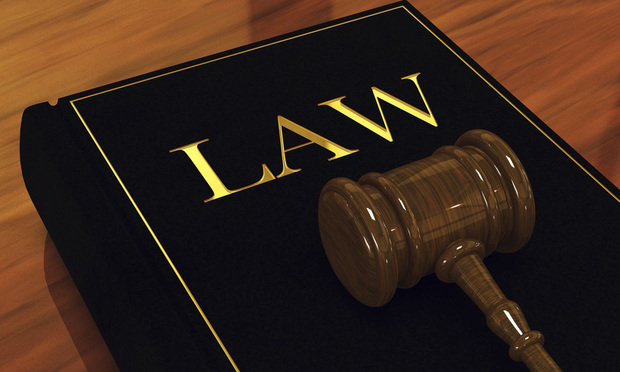Policymaking Role Pivotal as Panel Eyes Del. Party-Balance Mandate for Chancery, Supreme Courts
Attorneys argued at length Tuesday over whether Delaware judges qualify as policymakers, which became the central focus in Delaware Gov. John Carney's appeal of a trial court decision to strike down as unconstitutional a provision of the state constitution requiring party balance on key courts.
September 25, 2018 at 06:12 PM
5 minute read
The original version of this story was published on Delaware Law Weekly

Attorneys argued at length Tuesday over whether Delaware judges qualify as policymakers, which became the central focus in Delaware Gov. John Carney's appeal of a trial court decision to strike down as unconstitutional a provision of the state constitution requiring party balance on key courts.
The question, posed to a three-judge panel of the U.S. Court of Appeals for the Third Circuit, focused on the role such judges play in a constitutional democracy, and it promised to figure prominently into the appeals court's deliberations on whether to reinstate the 120-year-old party-balance mandate.
That's because policymakers fit within a narrow exception to the First Amendment prohibition against excluding government employment based on party affiliation. Critics of the requirement have said that it unconstitutionally prevents qualified applicants from serving as judges, and that it prevents independents from joining the judiciary altogether.
The requirement particularly affects Delaware's Supreme Court and the Court of Chancery, which are central to deciding issues of corporate law in a state that is home to more than half of the nation's Fortune 500 companies. It mandates that no more than a bare majority of the judges on each court be registered with either of the state's two major parties.
In December, a federal magistrate judge sided with plaintiff James Adams in holding that judges are not included under the policymaking exception because they are tasked with interpreting statute, not creating it. Adams, a registered independent who sued the administration last February, said he's been barred in the past from applying for judgeships because of the provision, which mandates that judicial seats on the Superior, Chancery and Supreme courts be split between Democrats and Republicans.
David C. McBride, who is representing Carney in the suit, argued that Delaware judges are constantly tasked with crafting new policy, especially in the area of corporate law. And he pointed to “literally dozens” of decisions that have determined the fiduciary duties of corporate directors.
“That is a judicial creation. That's not in a statute,” McBride, a partner with Young Conaway Stargatt & Taylor, said in the Philadelphia courtroom.
McBride said the purpose of the policymaker exception was to protect the ability of voters to elect a governor, who then appoints officials to positions, consistent with the executive's policy agenda.
“Judges are that kind of policymaker because, whether we like it or not, judges make decisions that impact the electorate and that the electorate has feelings about or concerns about or views about,” he said. “Judges' judicial philosophies impact the decisions they make, and those decisions affect people. And so, that is why judges are policymakers.”
David L. Finger, an attorney for Adams, countered that policymakers don't formulate policy, but rather help to implement it in service to the governor. In order to qualify for the policymaker exception, he argued, judges would need to have a political agenda in mind while deciding cases.
“That's why there's a requirement of a similarity of political goal. Judges don't have it, and they shouldn't have that,” said Finger, partner at the Wilmington plaintiffs firm Finger & Slanina. “If this court finds that judges are policymakers, it's announcing to the nation that the judges that they're going to appear before are going to make political decisions.”
Judges, Finger said, are also insulated from political pressure once they are nominated and confirmed. In Delaware, judges serve 12-year terms, compared to four-year terms for governors. Those intervals, he argued, help establish judicial independence and protect judges from the threat of not being reappointed as payback for a ruling.
Circuit Judge Theodore A. McKee granted extra time for argument to both sides Tuesday morning, because of the “complexity” of the case. McKee said multiple times throughout the hearing that Delaware's framework for judicial nominations was “very well thought-out,” even though he had concerns about its constitutionality.
Judges L. Felipe Restrepo and Julio M. Fuentes also joined in active questioning that peppered the more than hour-long hearing. Both, however, seemed skeptical of Carney's argument, with Restrepo at one point referring to the party-balance requirement as a “de facto ban” on applicants who do not belong to either major political party.
McBride replied in his rebuttal that the majority of courts have held that judges qualify as policymakers, and an adverse ruling would expose governors to lawsuits from applicants that are not picked for judgeships.
“It would work a massive change in how judicial positions are handled. It would work a massive change in what kind of litigation could be brought with respect to every judicial appointment in this country, not just in Delaware,” he said.
McKee said the panel would take the matter under advisement.
The lower court has meanwhile allowed Carney to continue nominating judges while the case is on appeal. Last week, he selected two women—one Democrat and one Republican—to fill two newly created openings on the Chancery Court.
The state Supreme Court has declined Carney's invitation to weigh in on the issue, but the justices said that any ruling would not be retroactive.
The case, on appeal to the Third Circuit, is captioned Carney v. Adams.
This content has been archived. It is available through our partners, LexisNexis® and Bloomberg Law.
To view this content, please continue to their sites.
Not a Lexis Subscriber?
Subscribe Now
Not a Bloomberg Law Subscriber?
Subscribe Now
NOT FOR REPRINT
© 2025 ALM Global, LLC, All Rights Reserved. Request academic re-use from www.copyright.com. All other uses, submit a request to [email protected]. For more information visit Asset & Logo Licensing.
You Might Like
View All


Zoom Faces Intellectual Property Suit Over AI-Based Augmented Video Conferencing
3 minute read
Etsy App Infringes on Storage, Retrieval Patents, New Suit Claims
Trending Stories
- 1Microsoft Becomes Latest Tech Company to Face Claims of Stealing Marketing Commissions from Influencers
- 2Coral Gables Attorney Busted for Stalking Lawyer
- 3Trump's DOJ Delays Releasing Jan. 6 FBI Agents List Under Consent Order
- 4Securities Report Says That 2024 Settlements Passed a Total of $5.2B
- 5'Intrusive' Parental Supervision Orders Are Illegal, NY Appeals Court Says
Who Got The Work
J. Brugh Lower of Gibbons has entered an appearance for industrial equipment supplier Devco Corporation in a pending trademark infringement lawsuit. The suit, accusing the defendant of selling knock-off Graco products, was filed Dec. 18 in New Jersey District Court by Rivkin Radler on behalf of Graco Inc. and Graco Minnesota. The case, assigned to U.S. District Judge Zahid N. Quraishi, is 3:24-cv-11294, Graco Inc. et al v. Devco Corporation.
Who Got The Work
Rebecca Maller-Stein and Kent A. Yalowitz of Arnold & Porter Kaye Scholer have entered their appearances for Hanaco Venture Capital and its executives, Lior Prosor and David Frankel, in a pending securities lawsuit. The action, filed on Dec. 24 in New York Southern District Court by Zell, Aron & Co. on behalf of Goldeneye Advisors, accuses the defendants of negligently and fraudulently managing the plaintiff's $1 million investment. The case, assigned to U.S. District Judge Vernon S. Broderick, is 1:24-cv-09918, Goldeneye Advisors, LLC v. Hanaco Venture Capital, Ltd. et al.
Who Got The Work
Attorneys from A&O Shearman has stepped in as defense counsel for Toronto-Dominion Bank and other defendants in a pending securities class action. The suit, filed Dec. 11 in New York Southern District Court by Bleichmar Fonti & Auld, accuses the defendants of concealing the bank's 'pervasive' deficiencies in regards to its compliance with the Bank Secrecy Act and the quality of its anti-money laundering controls. The case, assigned to U.S. District Judge Arun Subramanian, is 1:24-cv-09445, Gonzalez v. The Toronto-Dominion Bank et al.
Who Got The Work
Crown Castle International, a Pennsylvania company providing shared communications infrastructure, has turned to Luke D. Wolf of Gordon Rees Scully Mansukhani to fend off a pending breach-of-contract lawsuit. The court action, filed Nov. 25 in Michigan Eastern District Court by Hooper Hathaway PC on behalf of The Town Residences LLC, accuses Crown Castle of failing to transfer approximately $30,000 in utility payments from T-Mobile in breach of a roof-top lease and assignment agreement. The case, assigned to U.S. District Judge Susan K. Declercq, is 2:24-cv-13131, The Town Residences LLC v. T-Mobile US, Inc. et al.
Who Got The Work
Wilfred P. Coronato and Daniel M. Schwartz of McCarter & English have stepped in as defense counsel to Electrolux Home Products Inc. in a pending product liability lawsuit. The court action, filed Nov. 26 in New York Eastern District Court by Poulos Lopiccolo PC and Nagel Rice LLP on behalf of David Stern, alleges that the defendant's refrigerators’ drawers and shelving repeatedly break and fall apart within months after purchase. The case, assigned to U.S. District Judge Joan M. Azrack, is 2:24-cv-08204, Stern v. Electrolux Home Products, Inc.
Featured Firms
Law Offices of Gary Martin Hays & Associates, P.C.
(470) 294-1674
Law Offices of Mark E. Salomone
(857) 444-6468
Smith & Hassler
(713) 739-1250






